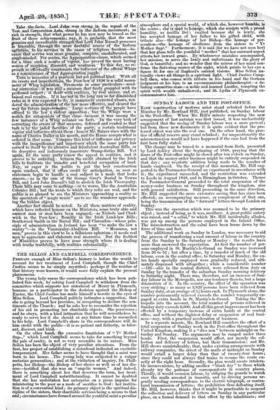SELLON, AND CAMPBELL CORRESPONDENCE— PERHAPS enough ef , Miss Sellon's history is
before the world to account for her treatment of Lord Campbell, though the Chief Justice sektis to he sithply mystified ; perhaps if the -residue of that histoty-were known) it- would snore fully explain the present phtenamena. . The young lady opens the correspondence which has been pub- lished this week, by asking Lord Campbell to withdraw from the committee which supports- her sisterhood of Mercy in Plymouth, beeause, as a participator in the decision against the Bishop of Exeter, the Chief justice has made- himself a heretic in the eyes of Miss Sellon. Lord Campbell politely intimates a Suggestion, that she is going beyond her province, in arrogating to declare the sen- timents of the Church ; and he asks her to reconsider the rejection of his aid in promoting her charitable objects. She perseveres ; and he obeys, with a kitnd intimation that he will nevertheless be ready to serve her if she should at any future time be reconciled to his help. Lord Campbell's share in the correspondence will do him credit with the public—it is so patient and fatherly, so toler- ant, discreet, and kiwi..
.0n the other head,. the excessive fanaticism of "Y" Mother &pr.," which Lord Campbell seems to take for something beyond the pale of sanity, is not so very recondite in its nature. Miss Sellon has-been the olsjeet of -Very peculiar attentions. From the first, her project of establishing a sisterhood indicated an excitable temperament Her father seems to have thought that a saint was born to his house. The young lady was subjected to a vulgar sectarian persecution. and at the visitation of inquiry, Dr. Phill- potts, her Ilisho-th"e Bishop of her choice as well as of her dio- cese—testified that she was an "angelic woman." And indeed, there is something about her that deserves the term, her treat- ment of Lord Campbell notwithstanding. It cannot be doubted that she has undertaken her enterprise on a pious impulse for ministering to the poor as a mode of sacrifice to God : her institu- tion is of a conventual kind ; its primary object is the spiritual dis- cipline of the sisters, their charitable services being a means to that cud; circumstances have formed around the youthful saint a peculiar atmosphere and a special world, of which she, however humble, is the centre ; sh_filuf+1 to:41taVe, which she's:cloths with a proud humility, as finale Del; exalted - because she is lowly, she has accepted hergage , pf, , her father to his gifted child, with tribute also—thli &Silage of - her - El:lop-L:41e - homage of per- Tseentsian-e4he . homage of obedience from the sisters to " Ye Mother :Sup," ' Furthermore it is said (for we have not seen her) that her glass .tells the. youthful "mother " that her outward aspect 'attests her inward grace. By whatsoever mistakes accompanied, her mission; to servo the lowly and unfortunate for the glory of God., is beautifuL; and no wonder that the mirror of her mind con- firms: the flattering' mineorof the sight; which' paints to her eye a figureefit for one of ;Raphael's sainted visions. Miss Salon na- turally views allthingoin a. spirituel light. 'Chief Justice Camp- belleni wlmi, comes: with tribute' in his hand and the Gorham judgment on his lips, , is an excommunicate philanthropist—a de- luding committee-man--,ra noble, and learned Luelfer, tempting the spirit with :wealth ' Unhallowed; And St. Lydia of 'Plymouth ex- s.communicates -Mai.: 1; ; -r I • : ; - 1: f i -.


























 Previous page
Previous page